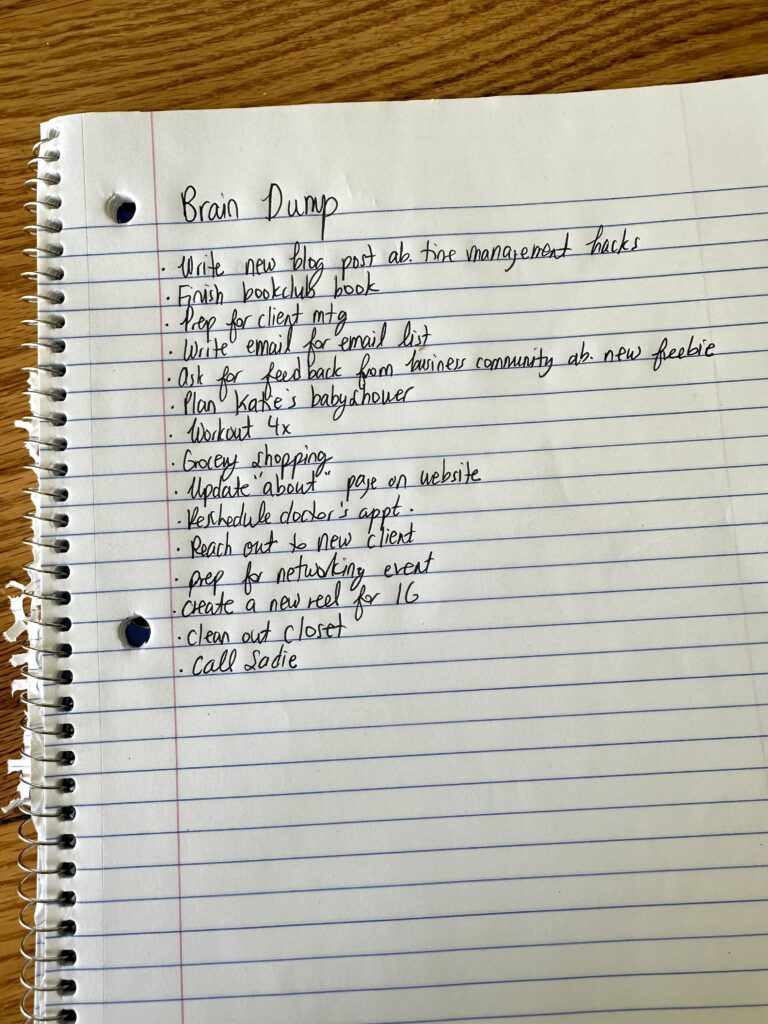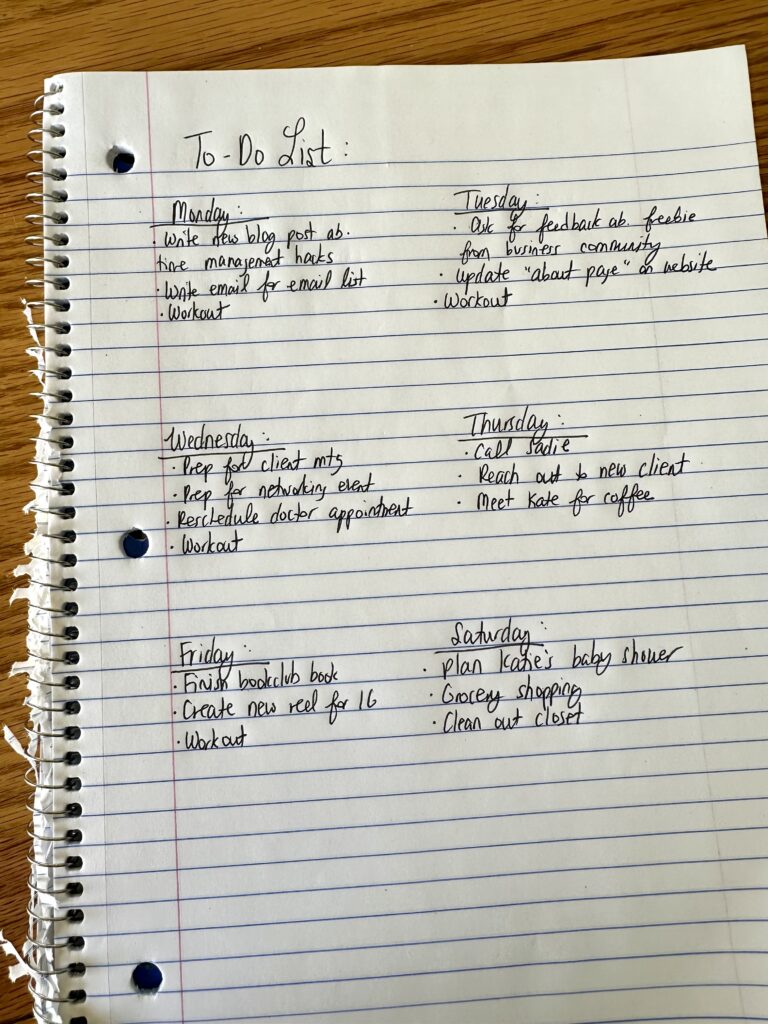Get ready to learn how to plan out your week in advance and actually get things done. If you’re the owner of a brick-and-mortar business especially, this post can help you avoid burnout, unproductive days, and frustration. Keep reading for more!

If you’re the owner of a brick-and-mortar business, then you know the work week can get crazy. Raise your hand if you often feel like you’re going a million miles a minute, but when you think back at the end of the day, you can’t remember what you actually did…You have nothing to show for the madness.
Instead of checking tasks off your to-do list, you ran around putting out a bunch of little fires all day. Here are my best tips for planning out your week in advance to maximize your time and minimize your stress:
Plan out your week on Sundays
I am a huge proponent of planning out your week on Sundays. If you had asked me a few years ago how I felt about this practice, I would’ve told you that I didn’t want to do anything work-related on Sundays, even something as simple as prepping for the week ahead.
BUT I’ve done a 180° since then, and here’s why:
- Weekly planning on Sundays lets you look back at the previous week while it’s still fresh on your mind. I record what went well, what I could’ve done better, and what I plan to do differently. It’s a great time to just stop and evaluate how work and my personal life are going.
- I don’t have to spend precious time and energy on Monday (while I’m still refreshed from the weekend) planning my weekly schedule. I can get straight to work—which brings me to my next point.
- Planning out my week on Sundays lets me hit the ground running on Monday morning. I get a lot done on Mondays because I have a game plan already in motion. My planner tells me what I need to do.
Have “theme days”
I love theme days and have used a variation of it for years. You might not have realized it at the time, but most of us grew up using the concept of “theme days.” Think about it: in school, you had theme days because you may’ve had the same classes on Tuesdays and Thursdays but not Mondays and Wednesdays and vice-versa.
Theme days are great because you already know what type of work you’re doing, and your brain doesn’t constantly have to recalibrate when you move from task to task to task. (Also, if you have ADD like I do, this method helps you stay focused on the task at hand.)
Here’s a sample schedule for theme days:
Tuesdays: Do inventory
Wednesdays: Batch and create social media content
Thursdays: Meetings/appointment day
Fridays: Write an email to your email list
Saturdays: Focus on clients/customers only and making their experience top-notch
Try to schedule all (or most) of your appointments and meetings on one day
Scheduling out all (or most) of your appointments and meetings on one day goes back to my last tip about theme days.
Before I revamped my strategy, I found that if I scheduled meetings throughout the week, it was hard to get my mind on the task at hand. For instance, one week, I had a meeting on Monday at 2pm, Wednesday at 9am, and Thursday at 12:15pm. At the end of the week, I was frustrated to discover that I actually hadn’t gotten everything I needed to done.
I felt exhausted, but I just assumed that meant I had been productive.
Here’s what I learned, though: productivity does not equal exhaustion and burnout.
On each of these days where I had meetings, I had to stop in the middle of what I was currently doing for work. Then, when I was finished with my meeting, it took me (at least) fifteen minutes to remember what I was working on and reorient myself with the unfinished task.
Now, I’ve designated Thursdays as my meetings day, and I can go from one meeting to the next and stay in the zone. And on my other “non-meeting days,” I’m more focused.
Schedule out your “non-negotiables” first
You know those big things that can’t be moved around on the calendar? Birthdays, trips, product launches, giveaways, events—non-negotiable things like that?
Schedule those out on your planner first.
It helps you to be more realistic with your schedule and set your priorities. You can then fill in your other tasks (the more flexible ones) in your planner around them.
Want a game plan to tackle the year and make it your best yet? Check out my post about Small Business Planning. Not only do I give you a guide for attracting your dream customers and increasing your profit this year, but I also give you a template to make a vision board and visualize success!
Make a brain dump list
If I feel really overwhelmed at the beginning of the week with everything I need to get done (whether business or personal), I make a list. It’s messy and unorganized (and sometimes illegible), but it lets me brain dump and get everything out on the page.
After I brain dump all my tasks, I then go through each one and assign it to a day. If you want to be really specific, you can also assign each task to a certain time of day, but being that detailed usually makes me feel more overwhelmed.
Your “brain dump” list may look something like this at first:

Then, once it’s organized, it may look like this. (Full disclosure, I use a planner to map out my week—which I’ll get to later. But for example’s sake, it was easier to show you this method in my notebook.)

Focus on 3 things you have to get done that week
If you know me, then you know I love my Full Focus planner. It really and truly keeps me from going crazy!
One aspect about this planner that I love is it highlights 3 goals you want to focus on for the upcoming week. These are your top tasks, the ones where you can breathe a sigh of relief if you finish them at the end of the week, even if you get nothing else accomplished.
Your big 3 weekly goals may look something like this:
- Write new sales page on website.
- Contact accountant about taxes.
- Record 3 new podcast episodes.
After you’ve written them down at the beginning of your week, then you can schedule out time to work on them throughout the week. Just remember, these are your top priorities.
You know how to plan out your week in advance. Now what?
Ready to be a more productive business owner and implement these tips for planning out your week in advance? You have all the tools you need, now you just have to make it happen.
Right now, write down a time in your planner when you can have a planning session. Like I said earlier, I’d encourage you to do this on a Sunday, but do what you need to in order to be effective.
Ready set go!

Madelyn is the owner of Madelyn Victoria Co. She’s a social media manager and ShowIt designer who helps service providers stand out online with a people-first strategy.
Madelyn believes your marketing should fuel growth, not drain your energy. Through strategic social media content and high-converting websites, she’s helped entrepreneurs get visible, build trust with their audience, and increase revenue by consistently attracting the right clients.






+ show Comments
- Hide Comments
add a comment